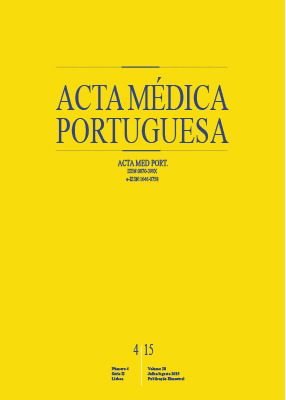Looking for the Perfect Mentor
DOI:
https://doi.org/10.20344/amp.6164Keywords:
Education, Medical, Continuing, Graduate, Internal Medicine/education, Internship and Residency, Mentors, Portugal, Questionnaires.Abstract
Introduction: The authors established the profile of the Internal Medicine clinical teachers in Portugal aiming to define a future interventional strategy plan as adequate as possible to the target group and to the problems identified by the residents.Material and Methods: Observational, transversal, analytic study. An online anonymous questionnaire was defined, evaluating the demographic characteristics of the clinical teachers, their path in Internal Medicine and their involvement in the residents learning process.
Results: We collected 213 valid questionnaires, making for an estimated response rate of 28.4%. Median global satisfaction with the clinical teacher was 4.52 (± 1.33 points) and the classification of the relationship between resident and clinical teacher was 4.86 ± 1.04 points. The perfect clinical teacher is defined by high standards of dedication and responsibility (4.9 ± 1.37 points), practical (4.8 ± 1.12 points) and theoretical skills (4.8 ± 1.07 points). The multiple linear regression model allowed to determine predictors of the resident’s satisfaction with their clinical teacher, justifying 82,5% of the variation of satisfaction with the clinical teacher (R2 = 0.83; R2 a = 0.82).
Discussion: Postgraduate medical education consists of an interaction between several areas of knowledge and intervening variables in the learning process having the clinical teacher in the central role. Overall, the pedagogical abilities were the most valued by the Internal Medicine residents regarding their clinical teacher, as determinants of a quality residentship.
Conclusion: This study demonstrates the critical relevance of the clinical teacher in the satisfaction of residents with their residentship. The established multiple linear regression model highlights the impact of the clinical and pedagogical relantionship with the clinical teacher in a relevant increase in the satisfaction with the latter.
Downloads
Downloads
Published
How to Cite
Issue
Section
License
All the articles published in the AMP are open access and comply with the requirements of funding agencies or academic institutions. The AMP is governed by the terms of the Creative Commons ‘Attribution – Non-Commercial Use - (CC-BY-NC)’ license, regarding the use by third parties.
It is the author’s responsibility to obtain approval for the reproduction of figures, tables, etc. from other publications.
Upon acceptance of an article for publication, the authors will be asked to complete the ICMJE “Copyright Liability and Copyright Sharing Statement “(http://www.actamedicaportuguesa.com/info/AMP-NormasPublicacao.pdf) and the “Declaration of Potential Conflicts of Interest” (http:// www.icmje.org/conflicts-of-interest). An e-mail will be sent to the corresponding author to acknowledge receipt of the manuscript.
After publication, the authors are authorised to make their articles available in repositories of their institutions of origin, as long as they always mention where they were published and according to the Creative Commons license.









